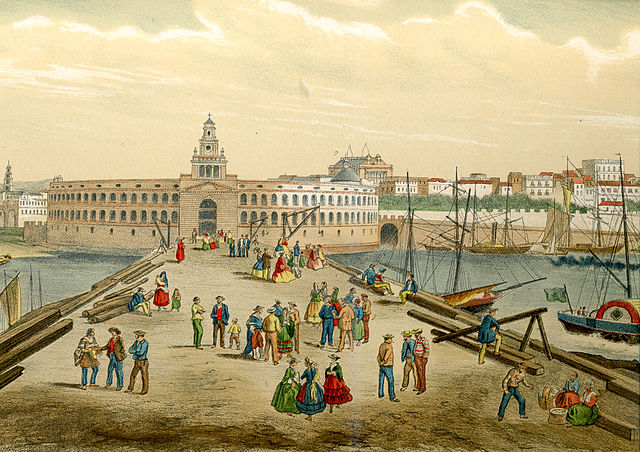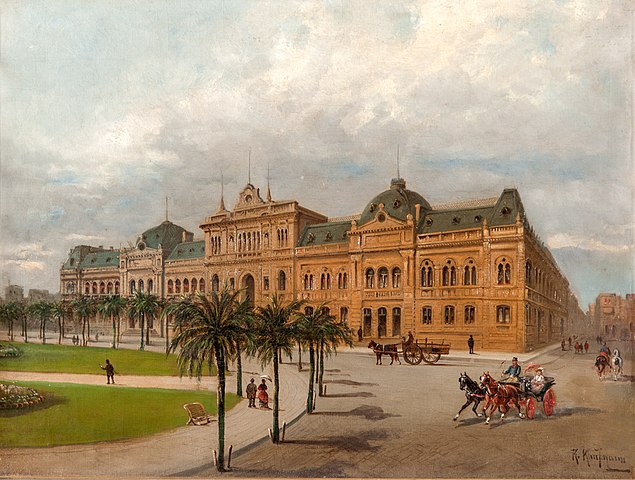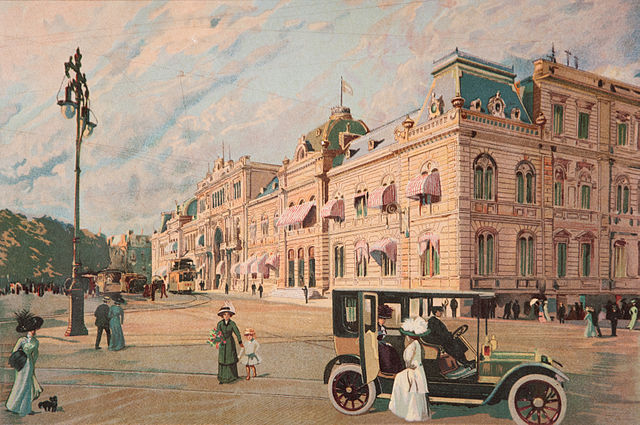
The TU Libraries have newly acquired books by and about a famous 20th century writer from Argentina who was also a blind librarian.
Jorge Luis Borges (1899–1986) wrote in Spanish, although he preferred to read books by English and French authors rather than literature from his own country. In 1955, he was named director of the National Public Library of Buenos Aires, Argentina, soon after he became blind from an inherited eye disease. He often wrote about the irony of being in charge of millions of books that he could not read, referring in one essay to his
own modest blindness. Modest, because it is total blindness in one eye, but only partial in the other. I can still make out certain colors; I can still see blue and green. And yellow, in particular, has remained faithful to me… One of the colors that the blind—or at least this blind man—do not see is black; another is red… I, who was accustomed to sleeping in total darkness, was bothered for a long time at having to sleep in this world of mist, in the greenish or bluish mist, vaguely luminous, which is the world of the blind. I wanted to lie down in darkness. The world of the blind is not the night that people imagine. (I should say that I am speaking for myself, and for my father and my grandmother, who both died blind—blind, laughing, and brave, as I also hope to die. They inherited many things—blindness, for example—but one does not inherit courage. I know that they were brave.)
Because Borges never learned the Braille alphabet, he was unable to read by himself, and relied on friends and assistants to read aloud to him. They also wrote down stories as he told them, and went through several versions as he continued to write. Among the books newly available in the TU Libraries is Labyrinths: Selected Stories & Other Writings. A collection of short stories and essays, Labyrinths has many admirers, but perhaps its biggest fan is Daniel Radcliffe, the British actor famous for playing the role of Harry Potter.

Radcliffe told Oprah Magazine:
Never, in my wildest dreams, could I write anything that approaches the level of cleverness and intellect and madness of Borges. I don’t think anyone could.
Radcliffe especially enjoys the story The Library of Babel:
Borges proves that if you can write a story in ten pages, it doesn’t need to be any longer…The premise is that contained somewhere in these books is the meaning of life. So cults develop that walk through the library searching for it. The fact that Borges could start with such an idea—an infinite library, what would that involve?—and then take it to a logical conclusion is remarkable.
Since Borges was also a noted ajarn at colleges in Buenos Aires and many other cities. After going blind, he decided to learn more and more to make up for no longer being able to see. Working with university students, he became knowledgeable in rare and ancient languages, such as Anglo-Saxon. In another book which the TU Libraries has acquired, Professor Borges: a Course on English Literature, student notes about his lectures are translated from the original Spanish. This is an odd and in many ways unrepresentative history of British writing since it only includes what interested Borges. There are lectures on Anglo-Saxon writing and other medieval epics and then little or nothing until the 19th century, when authors Borges cared about thrived.

There is also relatively little about recent British writing. Instead, such authors as Robert Louis Stevenson; Rudyard Kipling; G. K. Chesterton; and H. G. Wells are focused on. Since all of these are excellent writers, any Thai reader can benefit from getting to know them better. But be aware that many top-ranking British writers are not mentioned by Borges in his eccentric survey which was not intended to be a book in the first place, but rather an expression of personal taste. Among our new books is also The Cambridge Companion to Jorge Luis Borges, for anyone who wants to know up-to-date ideas about Borges by high-level academic experts.
Fighting back.
Borges may also be seen as an example of courage in the face of physical problems. He wrote about his decision to learn the Anglo-Saxon language as a reaction going blind:
I thought: I have lost the visible world, but now I am going to recover another, the world of my distant ancestors, those tribes of men who rowed across the stormy northern seas, from Germany, Denmark, and the Low Countries, who conquered England, and after whom we name England—since Angle-land, land of the Angles, had previously been called the land of the Britons, who were Celts… [Blindness] gave me Anglo-Saxon, it gave me some Scandinavian, it gave me a knowledge of Medieval literature I had ignored, it gave me the writing of various books, good or bad, but which justified the moment in which they were written. Moreover, blindness has made me feel surrounded by the kindness of others. People always feel good will toward the blind.

Thailand and the Blind.
As medical technology improves and eye ailments are treated better than in the past, the World Health Organization has praised Thailand, among other countries, for its impressive successes with efforts to eliminate blindness. As for the good will mentioned by Borges, all Bangkok residents are aware of the Foundation for the Blind in Thailand under the Royal Patronage of H.M. the Queen; The Thai Association of the Blind; The Christian Foundation for the Blind in Thailand; and The Father Ray Foundation. These benevolent associations which ask for volunteers and donations are especially valuable because of some stubborn preconceptions in the Kingdom. The Nation reported last month that The Thai Blind Orchestra, featuring musicians aged from eight to 15, is trying to overturn prejudices. There are an estimated 180,000 blind people in the Kingdom, and services for the disabled in a developing country are not always top-level. The Nation suggests that one problem may be the Buddhist belief in karma, according to which disabilities in this life may be associated with misbehavior in a previous life. This attitude of seeming to blame children for being blind, even if inadvertently, can seem cruel and insensitive to outside observers. Happily this belief of some older people does not seem as current in the younger generation. They are aware that Malaysia, Singapore, and the Philippines offer better services to the disabled than Thailand does. The orchestra’s conductor, Alongkot Chukaew, explained that teaching the kids was not easy:
It was hard because they cannot see the demonstration of where to put their fingers or hold the bows. But it was fun. Some people might not like their performance, but the kids are happy and have fun with it.
Since Thai children are not like Borges, surrounded by admirers ready to assist, they have all the more need of supportive guides such as Ajarn Alongkot. The Foundation for the Blind in Thailand asks for volunteers to read to students, help high-school age pupils with their homework, and other such tasks. Who knows, maybe one of them will grow up to be Thailand’s answer to Jorge Luis Borges.

(all images courtesy of Wikimedia Commons)
